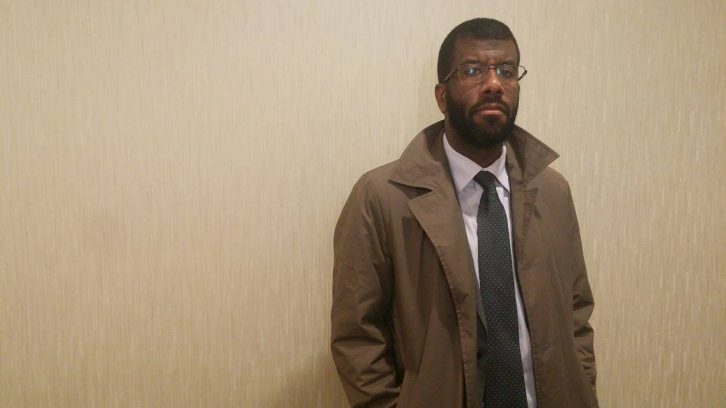
Lyle Howe (Jessica Durling, The Signal)
The Nova Scotia Barristers’ Society wants Lyle Howe not only disbarred from practising law for at least five years, but it says he should also have to pay between $450-600,000 of the costs of the disciplinary hearing against him.
The society estimates its total cost in the case at $1.1 million — a figure that doesn’t include Howe’s own legal costs — and argues Howe should pay between 40 and 60 per cent of it.
Those costs, laid out in the society’s Aug. 28. 2017, “submission on costs” to the hearing panel include:
- $733,417.76 to Halifax-based McInnes Cooper law firm for “advice to society during investigation and representation during hearing;”
- close to $70,000 to two local hotels to provide rooms in which to hold the hearings (the decision to move the hearings from the bar society offices was made by executive director Darrel Pink);
- more than $75,000 to the firm transcribing the testimony;
- and another $100,000-plus in “honoraria” to the three bar society panelists hearing the case.
Howe’s lawyer, Laura McCarthy, who is also his wife, calls the society’s claims “outrageous” and “beyond overkill.”
Howe was convicted in July of professional misconduct and professional incompetence in the longest, most expensive disciplinary case in bar society history. A penalty hearing is set for Sept. 12.
Howe, who is black, had argued throughout the 60 days of hearings spread over two years that he is a victim of systemic racism and the society had singled him out because of his race. (See “Who Is Lyle Howe and Why Are So Many People Saying Such Nasty Things About Him?” Part I and Part II.)
The society flatly denied those allegations, but the three-member panel, in its 140-page decision, did acknowledge Howe’s broader argument that he faced “a more difficult time in court from some judges, on some issues (such as needing an adjournment), than did other similarly situated [white] lawyers.” It also says the society’s decision to ask for a “Race and Culture Assessment of Howe” during the process “shows conclusively that… Mr. Howe’s race, colour, and cultural location, were factors in every subsequent decision made by the Society about him.”
Despite those findings, the panel ultimately concluded it was Howe’s “attempt to run a law practice as busily and as rapidly as humanly possible, or impossible [that] led to ethical lapses, poor documentation and abortive communications… poor relationships with Judges, Crowns and other lawyers and complaints” — and ultimately led to his conviction.
The bar society says Howe should now not only suffer the ultimate legal punishment — not being allowed to practise the profession for which he trained — but also be shackled with a debt he may never be able to repay, in Catch-22 part because he is not allowed to practise his profession.
While the society “acknowledges the significant dollar value” of the amount it wants Howe to pay “and the implications of that award to Mr. Howe,” it suggests, without quite using those words, that Howe is the author of his own misfortune. That the hearing took so long and cost so much is “a direct result of Mr. Howe’s own choices respecting the manner of conducting his case, where he chose not to make reasonable admissions, chose not to communicate in a timely way with the Society, chose to bring unnecessary procedural motions (often brought at the 11th hour), chose to conduct protracted examinations, and generally, unduly lengthened the hearing.”
There is an irony here, however.
The hearing panel, in its report, noted that, “given [Howe’s] personal interest in the matter, and that his career was possibly at stake, it is understandable Mr. Howe would sometimes devote a great deal of time to his questioning and arguments. That is his right when faced with allegations from the society.”
In response, the society countered that “while Mr. Howe had the right to choose the manner of conducting his case, that right brings costs consequences when, despite his choice of how to conduct his defence, findings are made against him.”
For his part, Howe says if the panel rules in favour of the society on costs now, it will make it less likely anyone else will challenge the system. “My case is the first time anyone has ever challenged the racism in the system,” Howe says. “If [the bar society] wins, that would dissuade anyone from ever challenging them again.”
The society does suggest Howe be allowed to pay his fine over time — up to 10 years. Laura McCarthy scoffs at that. “That means he would be paying $5,000 a month for the next 10 years. How is he supposed to do that when they won’t let him work in his career field. Disbarring him,” she says, “is not the worst punishment. The financial penalty is. They don’t want him to ever get out from under.”
“When I’ve talked with other members of the bar,” McCarthy adds, “they suggested he might face a small suspension, or time served [Howe has been suspended twice, including since September 2016), or maybe even a small fine. The people I talked to thought $100,000 would be a hefty fine.”
The two sides will make their arguments during the penalty phase hearing in September, and then the panel will make its decision.




 STEPHEN KIMBER, a Professor of Journalism at the University of King's College in Halifax and co-founder of its MFA in Creative Nonfiction Program, is an award-winning writer, editor and broadcaster. He is the author of two novels and eight non-fiction books. Buy his books
STEPHEN KIMBER, a Professor of Journalism at the University of King's College in Halifax and co-founder of its MFA in Creative Nonfiction Program, is an award-winning writer, editor and broadcaster. He is the author of two novels and eight non-fiction books. Buy his books